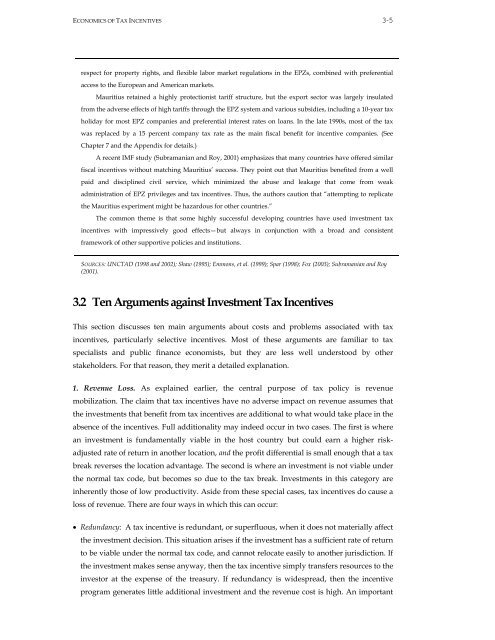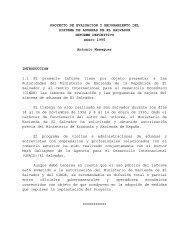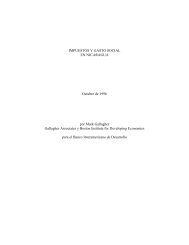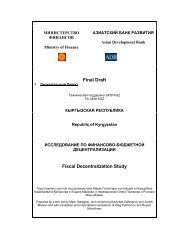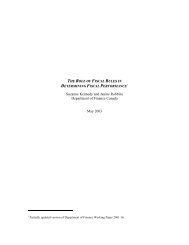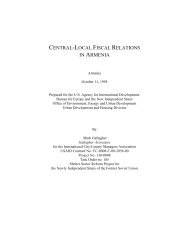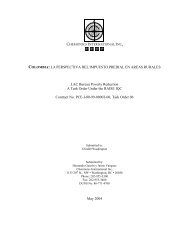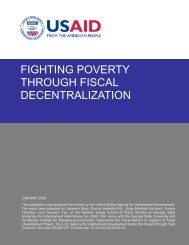Effectiveness and Economic Impact of Tax Incentives in the SADC ...
Effectiveness and Economic Impact of Tax Incentives in the SADC ...
Effectiveness and Economic Impact of Tax Incentives in the SADC ...
You also want an ePaper? Increase the reach of your titles
YUMPU automatically turns print PDFs into web optimized ePapers that Google loves.
ECONOMICS OF TAX INCENTIVES 3-5<br />
respect for property rights, <strong>and</strong> flexible labor market regulations <strong>in</strong> <strong>the</strong> EPZs, comb<strong>in</strong>ed with preferential<br />
access to <strong>the</strong> European <strong>and</strong> American markets.<br />
Mauritius reta<strong>in</strong>ed a highly protectionist tariff structure, but <strong>the</strong> export sector was largely <strong>in</strong>sulated<br />
from <strong>the</strong> adverse effects <strong>of</strong> high tariffs through <strong>the</strong> EPZ system <strong>and</strong> various subsidies, <strong>in</strong>clud<strong>in</strong>g a 10-year tax<br />
holiday for most EPZ companies <strong>and</strong> preferential <strong>in</strong>terest rates on loans. In <strong>the</strong> late 1990s, most <strong>of</strong> <strong>the</strong> tax<br />
was replaced by a 15 percent company tax rate as <strong>the</strong> ma<strong>in</strong> fiscal benefit for <strong>in</strong>centive companies. (See<br />
Chapter 7 <strong>and</strong> <strong>the</strong> Appendix for details.)<br />
A recent IMF study (Subramanian <strong>and</strong> Roy, 2001) emphasizes that many countries have <strong>of</strong>fered similar<br />
fiscal <strong>in</strong>centives without match<strong>in</strong>g Mauritius’ success. They po<strong>in</strong>t out that Mauritius benefited from a well<br />
paid <strong>and</strong> discipl<strong>in</strong>ed civil service, which m<strong>in</strong>imized <strong>the</strong> abuse <strong>and</strong> leakage that come from weak<br />
adm<strong>in</strong>istration <strong>of</strong> EPZ privileges <strong>and</strong> tax <strong>in</strong>centives. Thus, <strong>the</strong> authors caution that “attempt<strong>in</strong>g to replicate<br />
<strong>the</strong> Mauritius experiment might be hazardous for o<strong>the</strong>r countries.”<br />
The common <strong>the</strong>me is that some highly successful develop<strong>in</strong>g countries have used <strong>in</strong>vestment tax<br />
<strong>in</strong>centives with impressively good effects—but always <strong>in</strong> conjunction with a broad <strong>and</strong> consistent<br />
framework <strong>of</strong> o<strong>the</strong>r supportive policies <strong>and</strong> <strong>in</strong>stitutions.<br />
SOURCES: UNCTAD (1998 <strong>and</strong> 2002); Shaw (1995); Emmons, et al. (1999); Spar (1998); Fox (2003); Subramanian <strong>and</strong> Roy<br />
(2001).<br />
3.2 Ten Arguments aga<strong>in</strong>st Investment <strong>Tax</strong> <strong>Incentives</strong><br />
This section discusses ten ma<strong>in</strong> arguments about costs <strong>and</strong> problems associated with tax<br />
<strong>in</strong>centives, particularly selective <strong>in</strong>centives. Most <strong>of</strong> <strong>the</strong>se arguments are familiar to tax<br />
specialists <strong>and</strong> public f<strong>in</strong>ance economists, but <strong>the</strong>y are less well understood by o<strong>the</strong>r<br />
stakeholders. For that reason, <strong>the</strong>y merit a detailed explanation.<br />
1. Revenue Loss. As expla<strong>in</strong>ed earlier, <strong>the</strong> central purpose <strong>of</strong> tax policy is revenue<br />
mobilization. The claim that tax <strong>in</strong>centives have no adverse impact on revenue assumes that<br />
<strong>the</strong> <strong>in</strong>vestments that benefit from tax <strong>in</strong>centives are additional to what would take place <strong>in</strong> <strong>the</strong><br />
absence <strong>of</strong> <strong>the</strong> <strong>in</strong>centives. Full additionality may <strong>in</strong>deed occur <strong>in</strong> two cases. The first is where<br />
an <strong>in</strong>vestment is fundamentally viable <strong>in</strong> <strong>the</strong> host country but could earn a higher risk-<br />
adjusted rate <strong>of</strong> return <strong>in</strong> ano<strong>the</strong>r location, <strong>and</strong> <strong>the</strong> pr<strong>of</strong>it differential is small enough that a tax<br />
break reverses <strong>the</strong> location advantage. The second is where an <strong>in</strong>vestment is not viable under<br />
<strong>the</strong> normal tax code, but becomes so due to <strong>the</strong> tax break. Investments <strong>in</strong> this category are<br />
<strong>in</strong>herently those <strong>of</strong> low productivity. Aside from <strong>the</strong>se special cases, tax <strong>in</strong>centives do cause a<br />
loss <strong>of</strong> revenue. There are four ways <strong>in</strong> which this can occur:<br />
•<br />
Redundancy: A tax <strong>in</strong>centive is redundant, or superfluous, when it does not materially affect<br />
<strong>the</strong> <strong>in</strong>vestment decision. This situation arises if <strong>the</strong> <strong>in</strong>vestment has a sufficient rate <strong>of</strong> return<br />
to be viable under <strong>the</strong> normal tax code, <strong>and</strong> cannot relocate easily to ano<strong>the</strong>r jurisdiction. If<br />
<strong>the</strong> <strong>in</strong>vestment makes sense anyway, <strong>the</strong>n <strong>the</strong> tax <strong>in</strong>centive simply transfers resources to <strong>the</strong><br />
<strong>in</strong>vestor at <strong>the</strong> expense <strong>of</strong> <strong>the</strong> treasury. If redundancy is widespread, <strong>the</strong>n <strong>the</strong> <strong>in</strong>centive<br />
program generates little additional <strong>in</strong>vestment <strong>and</strong> <strong>the</strong> revenue cost is high. An important


